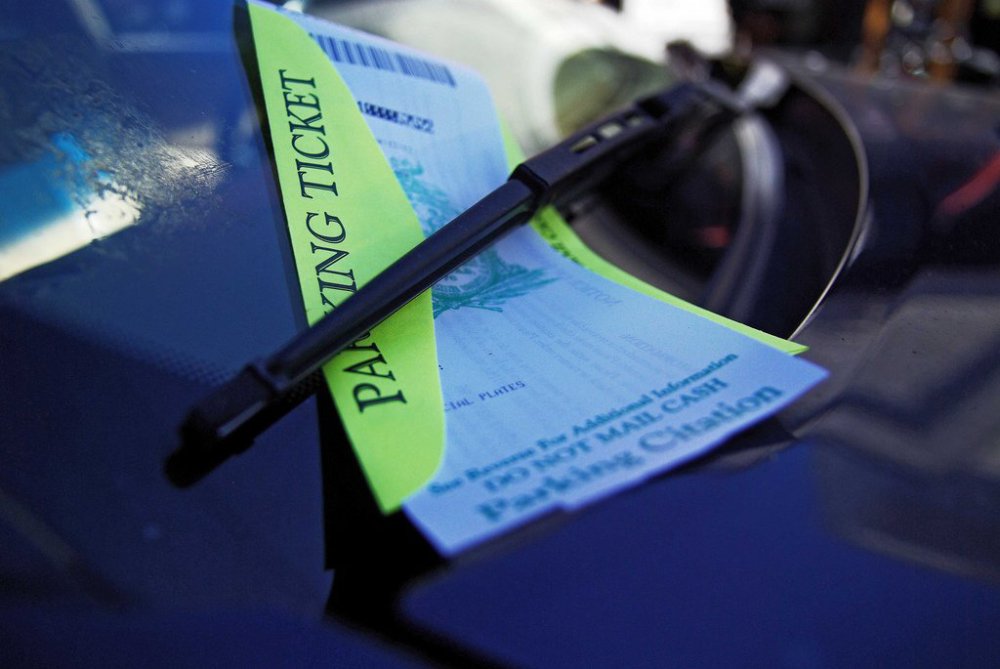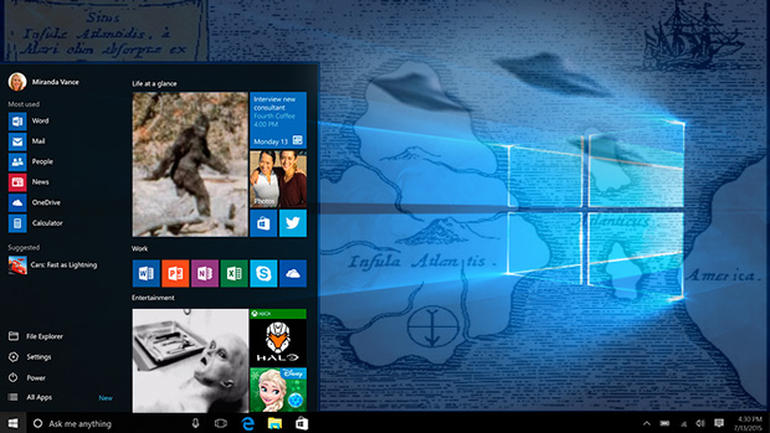-
Posts
7,282 -
Joined
-
Last visited
-
Days Won
2,416
Content Type
Forums
Blogs
Events
Resources
Downloads
Gallery
Store
Everything posted by allheart55 Cindy E
-

Need ethernet windows 7 driver for ASUS mobo
allheart55 Cindy E replied to mikehende's topic in Tech Help and Discussions
Yes, it was, Mike! -
Hiring a lawyer for a parking-ticket appeal is not only a headache, but it can also cost more than the ticket itself. Depending on the case and the lawyer, an appeal — a legal process where you argue out of paying the fine — can cost between $400 to $900. But with the help of a robot made by British programmer Joshua Browder, 19, it costs nothing. Browder's bot handles questions about parking-ticket appeals in the UK. Since launching in late 2015, it has successfully appealed $3 million worth of tickets. Joshua Browder's robot can help answer questions about parking tickets. Once you sign in, a chat screen pops up. To learn about your case, the bot asks questions like "Were you the one driving?" and "Was it hard to understand the parking signs?" It then spits out an appeal letter, which you mail to the court. If the robot is completely confused, it tells you how to contact Browder directly. The site is still in beta, and the full version will launch this spring, Browder, a Stanford University freshman, tells Tech Insider. Since laws are publicly available, bots can automate some of the simple tasks that human lawyers have had to do for centuries. Browder's isn't even the first lawyer bot. The startup Acadmx's bot creates perfectly formatted legal briefs. The company Lex Machina does data mining on judges' records and makes predictions on what they will do in the future. Beyond parking tickets, Browder's bot can also help with delayed or canceled flights and payment-protection insurance (PPI) claims. Although the bot can only help file claims on simple legal issues — it can't physically argue a case in front of a judge — it can save users a lot of money. Browder programmed his robot based on a conversation algorithm. It uses keywords, pronouns, and word order to understand the user's issue. He says that the more people use the robot, the more intelligent it becomes. Its algorithm can quickly analyze large amounts of data while improving itself in the process. Although Browder programmed the bot according to UK law, he says it can be helpful in the US, too. For example, if a flight is delayed from New York City to London, the ticket holder can use the robot to claim compensation. Browder is working to program US city laws into the bot, starting with New York. In the future, people won't likely need to hire lawyers for simple legal appeals — they'll just use a bot. While Browder doesn't think robots will be debating in the US Supreme Court anytime soon, he believes that, as artificial intelligence technology progresses, fewer lawyers will do mundane tasks. "As a 19-year-old, I have coded the entirety of the robot on my own, and I think it does a reasonable job of replacing parking lawyers," he says. "I know there are thousands of programmers with decades more experience than me working on similar issues." Kevin LamarqueUS Supreme Court Justices Ruth Bader Ginsburg and Stephen Breyer. But are bots like these the same as hiring a lawyer? It depends on whether they cross the ethical line of giving subjective advice, says Bradley Moss, a DC attorney who specializes in national security. If the bot were to answer subjective questions, then that would be viewed as practicing law, which only humans can legally do. Moss says (emphasis added): There are ethical and legal limits to what they can do. Programs such as this one do not, at least in my humble opinion, threaten the legal profession writ large. They will, however, continue to streamline processes for handling simple tasks that arguably people should be able to handle without the need for — and expense of — formal legal assistance. MGM Studios"Legally Blonde's" beloved yet fictitious lawyer, Elle Woods (Reese Witherspoon). Most of these bots are tools that can rapidly crawl public records and serve up legal information. Bots can't provide full and genuine legal counsel, and it will likely take them several decades to become as sophisticated as humans, says Samuel Woolley, who tracks and studies political bots. "Bots can't fully replace human actors — not in the foreseeable future, at least," he tells Tech Insider. "They can't provide nuanced social insight because they can't really understand humor or emotional subtleties." When driverless cars start dominating the roads in the future, they may also automatically appeal speeding tickets. Browder is already talking with entrepreneurs about integrating his bot into cars. He's programming the bot to handle more complicated legal issues, too, including asylum for Syrian refugees. The language barrier is a coding challenge, since the robot needs to understand Arabic but produce a legal document in English. This bot will likely launch by summer — at no cost. "If it is one day possible for any citizen to get the same standard of legal representation as a billionaire," Browder says, "how can that not be a good thing?" Source: businessinsider
-

How to avoid potentially unwanted programs
allheart55 Cindy E replied to starbuck's topic in Tech Help and Discussions
I also use Unchecky and install it on every computer I touch. Works like a charm. Also, as Dougie pointed out, custom install every time, if possible. -
That'll do it. At least you found the problem. :thumbsup:
-
You should be able to move freely from one tab to the next. The only time you should need to reboot is if you select the F10 key to save changes. There is something wrong if you cannot do that.
-
I'm not sure exactly what is happening when you are in the BIOS, Peter. You shouldn't have to reboot unless you select F10 to save any changes that you have made. If you want to enable hyper threading, this is a video that explains how to do it. https://www.youtube.com/watch?v=7rscmqrFWac
-
-

Monitor issue with own build
allheart55 Cindy E replied to peterr's topic in Tech Help and Discussions
Thank you, Peter! Please let us know if you need help with your selections. -
Yeah, they aren't cheap, for sure. They are a little over $300. here in the U.S. It's still a lot less expensive here than in Australia.
-
YOU might have noticed that even when using a lightning-fast Internet connection, it takes a few beats, enough time to drum your fingers, for web pages to load. It’s likely because of online advertising, which bogs down your browser, drains your battery and jacks up mobile charges — not to mention collects private data. a study conducted by Adobe and PageFair. This represents an existential threat to the $50 billion online advertising industry and has ignited a bitter feud between advertisers and developers of ad-blocking apps. On the sidelines, privacy advocates are pumping their fists for consumer choice while web publishers wring their hands over lost revenue. The fight became public last month when Randall Rothenberg, the president and chief executive of the Interactive Advertising Bureau, lobbed several verbal grenades at developers of ad blockers during his keynote address to his group’s annual leadership meeting. He called them “an unethical, immoral, mendacious coven of techie wannabes.” His venom was directed particularly at for-profit ad blockers who, for a fee, will unblock advertisers who meet certain standards of nonintrusiveness. Rothenberg called the practice “extortion.” Ad blockers fired right back. “We are as motivated to protect consumers as advertisers are to abuse them,” said Roi Carthy, the chief marketing officer for Shine, an Israeli company that recently began offering ad-blocking software to wireless carriers, which are increasingly weary of the burden data-intensive ads place on their networks. Heretofore, ad blockers were mainly sold or given away to individuals. “This is a holy war for us,” Mr. Carthy said. Shine is partly financed by the Hong Kong billionaire Li Ka-Shing who also has stakes in Facebook, Spotify and the Bitcoin payment company BitPay. Shine’s first major client is the Caribbean mobile service Digicel, and Mr. Carthy claims his team is negotiating with 60 other carriers. Advertisement Continue reading the main story Within the last six months or so, ad blocking has left the geek realm and gone mainstream. Howard Stern raved about ad blockers on his radio show, and ad blocking was the theme of a recent episode of “South Park.” Moreover, when Apple made ad blockers available in its App Store last fall, they quickly became among the most downloaded apps. And later this year, Microsoft is reportedly going to allow an extension to its Edge browser that supports the most popular blocker, Adblock Plus. Read what you will into the fact that Apple and Microsoft’s business models aren’t overly reliant on advertising, unlike their rivals Google and Facebook. But focusing on ad-blocking software misses the real point, said Jason Kint, the chief executive of Digital Content Next, a trade organization that represents digital content companies like ESPN, Bloomberg, Condé Nast, BBC and The New York Times. “By installing ad blockers, consumers are telling us very clearly they don’t want to be tracked across the web,” he said. “That’s going to be uncomfortable for a lot of advertising technology companies out there who have been enjoying what has been the Wild West.” The advertising industry’s solution thus far has been AdChoices, a program that allows consumers to opt out of some targeted ads. But critics dismiss it as window dressing because it’s confusingly presented, cumbersome to enable and not comprehensive, and does not stop tracking. While The New York Times is still weighing its options, other web publishers have responded to ad blockers using a variety of tactics. Some, like Forbes, have fought back with technology that blocks the ad blockers. But judging from the experience of the technology news website Ars Technica, blocking the blockers is a futile exercise. BACK in 2010, Ars Technica tried it, and within 12 hours a coder had uploaded a workaround to Adblock Plus. Following that, the site’s founder and editor in chief, Ken Fisher, wrote an article titled “Why Ad Blocking Is Devastating to the Sites You Love.” “That article lowered the ad-block rate by 12 percent, and what we found was that the majority of people blocking ads on our site were doing it because other sites were irritating them,” Mr. Fisher said. “It’s the worst players in the web publishing world that’s driving this.” But he said the number of ad blockers is creeping back up, so Ars Technica plans to start a program similar to ones that have been used on a trial basis on other sites like Wired, The Washington Post, Slate and The Atlantic. The goal is to detect people who are blocking and inform them of ways to support the site. They can selectively unblock the site, subscribe, buy temporary access or just keep reading knowing it’s depriving the site of needed revenue. A possible gauge of the effectiveness of guilt is listener-supported NPR, which has a 36 percent donation rate. “The temptation is to block these people who honestly aren’t going to respond to ads anyway,” Mr. Fisher said. “I think what everybody should focus on is the educational aspect and give people the option to pay for an ad-free experience.” Advertisement Continue reading the main story Google recently began offering that option with its Contributor program. And Sprint’s Boost Mobile is testing a program where it actually pays users to look at ads. But it may be instructive to look at what happened back in the 1990s when spam was the scourge of consumers. The fix came only when entities like Spamhaus started compiling lists of bad actors, based in part on what consumers marked as spam. Email providers then subscribed to those lists so they could block offenders. Craig Spiezle, executive director of the Online Trust Alliance, a consumer advocacy group, said something similar could happen with online advertising, where stakeholders agree to observe best practices, including respecting Do Not Track, or D.N.T., which is a preference consumers can activate in their browsers. Right now, D.N.T. is largely ignored by advertisers and websites. Obscuring ads and autoplay audio and video would also likely be prohibited. “Those who don’t follow the rules will be blacklisted like spammers,” said Mr. Spiezle, who formerly oversaw security of Microsoft’s Hotmail. The Federal Trade Commission has yet to intervene on this issue. And it’s unlikely that Congress will act given how heavily politicians rely on tracking and other online advertising technology to court voters. The Online Trust Alliance conducted an audit of the presidential candidates, and the vast majority received failing grades in terms of tracking and protecting the privacy of the people who visited their websites. “Ad blocking is a symptom of a pervasive problem,” Mr. Spiezle said. “If consumers enjoyed the web experience and felt there were adequate controls for privacy and the ad industry was making a sincere effort to fight abuse and malfeasance, we wouldn’t be having this conversation.” Source: nytimes
- 1 reply
-
- ad-blocking
- advertisers
-
(and 3 more)
Tagged with:
-
-

Monitor issue with own build
allheart55 Cindy E replied to peterr's topic in Tech Help and Discussions
Let us know if you change your mind, Peter. We'll be here. -

Monitor issue with own build
allheart55 Cindy E replied to peterr's topic in Tech Help and Discussions
Have you definitely decided to go with Intel? I personally think that you can get more bang for your buck with AMD. It depends on what you are using your computer for. -
I was looking at a Samsung M.2 and they are pricey.
-

Monitor issue with own build
allheart55 Cindy E replied to peterr's topic in Tech Help and Discussions
That's a great idea, Dougie. -
I get them all of the time on my cell phone. Strange voices asking for people by names that I don't know.
- 5 replies
-
- autodialed
- debt collection
-
(and 2 more)
Tagged with:
-
Does anyone remember the gas shortage of 1979? Gas could only be obtained according to your license plate. (Odd and Even days.)
- 6 replies
-
- competitors
- computer glitch
-
(and 2 more)
Tagged with:
-
Too bad this didn't happen in Pennsylvania.
- 6 replies
-
- 1
-

-
- competitors
- computer glitch
-
(and 2 more)
Tagged with:
-
How many unwanted pre-recorded and/or autodialed calls have you received so far this year? Judging by the numbers in one new report, we’re guessing it’s a lot. According to the latest YouMail National Robocall Index, some 2.3 billion robocalls were placed in January alone. That comes out to around seven robocalls for every single person the country, or 858 robocalls placed every second of every day. Not surprisingly, most of the biggest robocallers are trying to collect some sort of debt. Fifteen of the 20 most frequent robocallers in the January Index were debt collection calls. Just these fifteen numbers placed close to 175 million calls in a single month. In terms of which markets are receiving the most robocalls, Atlanta had both the highest number of total robocalls (approximately 99.6 million) received in January and the highest per capita rate in an area code, with 36 robocalls received for every person in the 404 area code. Dallas, home to AT&T, was a distant second in total robocalls (79.6 million), followed by Chicago (77.9 million), Houston (74.6 million), and New York City (66.3 million). The other area codes with high per capita robocall rates were Baton Rouge, LA (31 calls per capita for the 225 area code), Washington, D.C. (25 calls per capita in the 202 area code), Memphis (20 calls per capita in the 901 area code) and Macon, GA’s 478 area code, 19 calls per capita. YouMail also notes the 46% spike in robocalls in Iowa and the similar 55% jump in New Hampshire, as politicians geared up for those states respective preliminary presidential showdowns. Likewise, the South Carolina markets of Charleston and Columbia saw significant increases in robocall traffic. It should be noted that YouMail, which provides independent voicemail and call-blocking services, does have a commercial interest in tallying and publicizing these numbers. Our colleagues at Consumers Union have been pushing the nation’s biggest phone providers to give customers a free and simple way to filter out nuisance robocalls. While there are numerous ways for telecom providers to offer this sort of feature to customers, the industry has been incredibly reluctant. Time Warner Cable, which provides VoIP phone service to millions of customers did recently break step with its older peers by integrating the free Nomorobo robocall-blocker into its service. Source: consumerist
- 5 replies
-
- autodialed
- debt collection
-
(and 2 more)
Tagged with:
-
-
-
Me too. It's almost time for my weekly 10 boot.
- 4 replies
-
- conspiracy theory
- evidence
-
(and 2 more)
Tagged with:
-
The media is awash with FUD-ridden claims that Windows 10 is "spying" on users, sending to Microsoft all your data and secrets. It's total hogwash, and no one making these claims can produce a scrap of evidence to back up their claims. I love the X-Files, and I enjoy a conspiracy theory as much as the other guy, but there needs to be evidence, and I've seen more far compelling evidence for the existence of Bigfoot, the Roswell crash, or the Lost City of Atlantis than I have for the allegation that Microsoft is using Windows 10 to spy on users. And believe you me, I've spent countless hours searching for a smoking gun, with no success. Like my ZDNet colleague Simon Bisson, all I found was innocuous telemetry data. This is why I've put the word "spying" in quotation marks in the title, and I'm only using this word because this is the word most commonly used by those concerned by this issue. If you ask me whether I'm worried about using Windows 10, my answer would be "no." I have dozens of Windows 10 installations here and I'm not in the least bit worried. But despite such reassurances, there are a lot of people who are concerned by this, and the fact that Microsoft isn't willing to give concerned users an official way to opt out from data collection (which I think is a bad idea) is adding fuel to the flames. After all, as Bisson pointed out, we live in "justifiably paranoid times," where governments and social media sites are slurping up user data. What's wrong with a little protection? If you are worried about Windows 10 privacy, I suggest that you take matters into your own hands and install a tool that allows you to shut down all the different ways that your PC is communicating with Microsoft. Be aware though that doing this will result in some features no longer being available, since a number of Windows 10 features rely on having a connection to the cloud. Be careful though. I've come across a number of "Windows 10 privacy tools" from unknown sources that do who knows what. Some tools actively display ads, and one even installs a third-party tool that displays ads in other applications. Talk about taking what is a non-issue and blowing it up into a real problem! No self-respecting privacy tool should install adware onto a system. Period. I've tried a number of Windows 10 privacy tools and boiled them down to two. The first is Spybot Anti-Beacon. This is a one-click solution (along with an undo button in case things don't go as you planned) from a known developer that's been in the privacy business since 2000. Another tool that I like is O&O Shut Up 10. This one is particularly useful if you have multiple PCs because it doesn't need to be installed and can be run from a USB flash drive. O&O also offers a good explanation as to why Windows 10 needs to be able to communicate with the cloud. "As an example, Windows 10 can remind you to set off to the airport 30 minutes earlier due to traffic en route. In order to deliver this information to you, however, Windows 10 has to access your calendar entries, your mails (i.e. the airline confirmation email), your location and it has to have access to the internet to get traffic news." I've tested both of these tools on a variety of systems and both utilities seem to do what it says it does on the tin, and nothing more. If nothing else, they put you in charge of what happens to your data. If something stops working (or you break something) as a result of using these tools, well, that probably explains why Microsoft doesn't want you to have this sort of granular control over communications to and from your PC. And if you're still worried, then fire up your PC, install Wireshark, and examine the packets yourself. Source: zdnet
- 4 replies
-
- conspiracy theory
- evidence
-
(and 2 more)
Tagged with:
-









